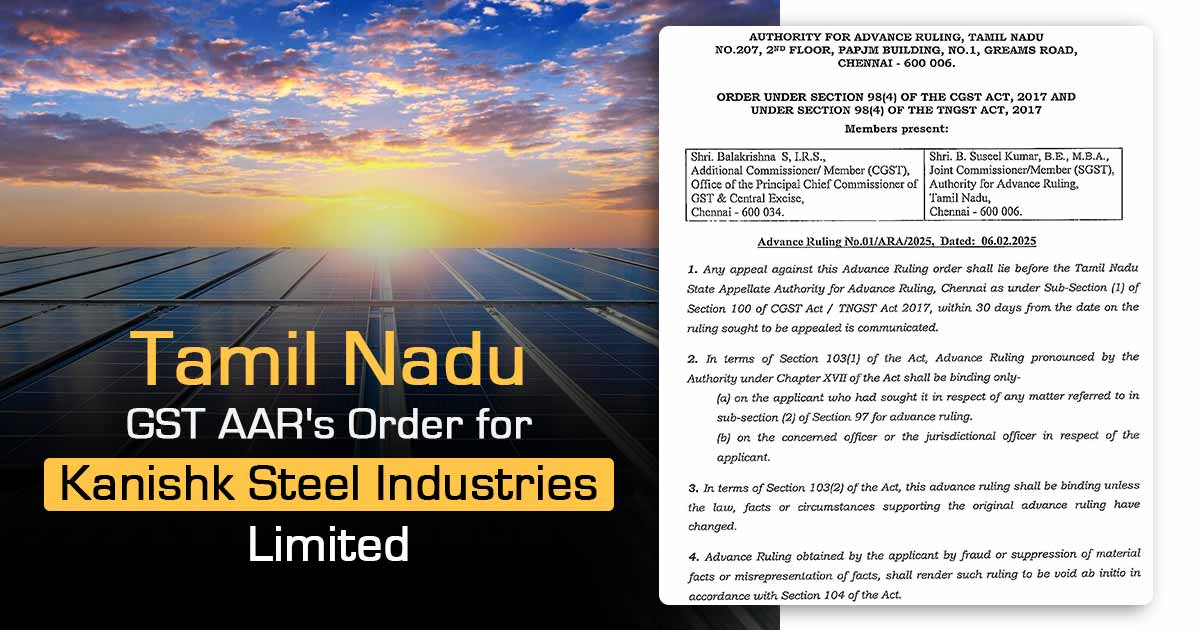
In a key development for India’s renewable energy and manufacturing sectors, the Tamil Nadu Authority for Advance Ruling (AAR) has determined that Kanishk Steel Industries Limited, a prominent steel manufacturer is not eligible to claim Input Tax Credit (ITC) on goods and services used solely for the operation and maintenance of its 10.2 MW solar power plant.
This decision sets a notable precedent and may impact other industries seeking tax credit benefits for renewable energy-related expenditures.
The ruling by the authority states that electricity generation, when supplied to the state grid and subsequently credited for use in manufacturing, is categorised as an exempt supply. As a result, this classification prevents entitlement to Input Tax Credit (ITC) under the Central Goods and Services Tax (CGST) and Tamil Nadu Goods and Services Tax (TNGST) Act.
Kanishk Steel is in manufacturing steel at its Gummidipoondi facility, and asked for the clarity on ITC claims as it replaced its windmills with a large-scale solar plant in Kayathar Taluk, Tuticorin District, Tamil Nadu.
The solar capacity was committed to powering the company’s own steel production, with all generated electricity transferred to the Tamil Nadu Generation and Distribution Corporation Limited (TANGEDCO) grid. Against the company’s factory, consumption energy credits were set off without any banking agreement for surplus electricity.
The company contended that the solar plant, categorised as plant and machinery, was eligible for Input Tax Credit (ITC) on installation, maintenance, and operational expenses. This argument was based on Section 16 of the GST Act and supported by rulings from the Authority for Advance Rulings (AARs) in various states. The company reasoned that all associated activities, including captive power generation, were integral to its business operations, thereby justifying the entitlement to the credit.
The two-member panel, Shri Balakrishna S (CGST) and Shri B. Suseel Kumar (SGST), ruled against the claim of Kanishk Steel.
It said that electricity generation and supply to TANGEDCO is supplied under GST but draws a “nil” rate of tax, categorised as an exempt supply (HSN 27160000). Therefore, the Goods and services used only to provide exempt supplies are not qualified for ITC, as per Section 17(2) and pertinent rules.
The lack of direct captive consumption (i.e., on-site use of electricity) makes the output of power plants within ITC restrictions, despite credits being used for manufacturing. The plant capitalised as plant and machinery does not override statutory restrictions on credits for exempt supplies.
While Kanishk Steel pointed to identical rulings from Tamil Nadu, Karnataka, and Rajasthan that favoured ITC for captive solar plants, the AAR ruled that these were factually distinct, as, in those matters, “captive consumption” signifies direct use without supply and re-credit from a third-party grid.
Till there is a consumption of solar power directly at the place of generation, and not supplied through third-party grids, Input Tax Credit (ITC) on pertinent goods and services is blocked where the supply is classified as exempt.
| Case Title | M/S Kanishk Steel Industries Limited |
| GSTIN | 33AABCK2367G1ZS |
| Advance Ruling No. | 01/ARA/2025 |
| Date | 06.02.2025 |
| Tamil Nadu AAR | Read Order |










very informative – tks